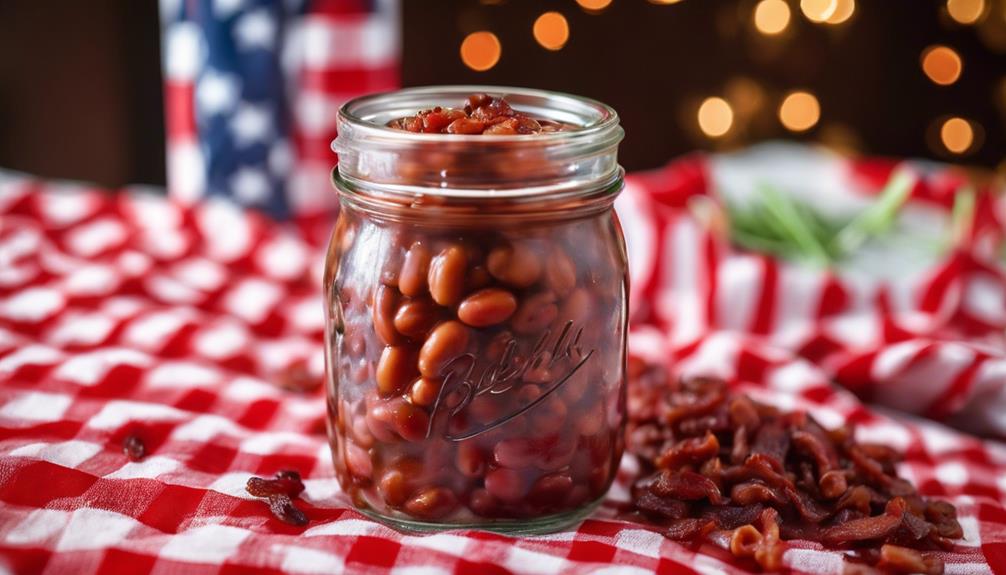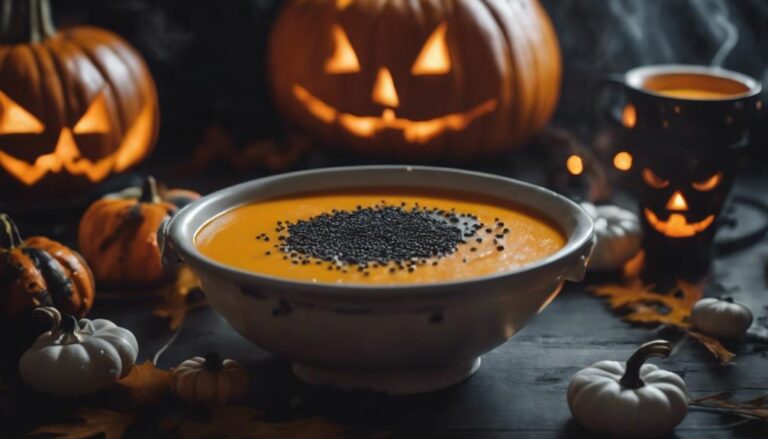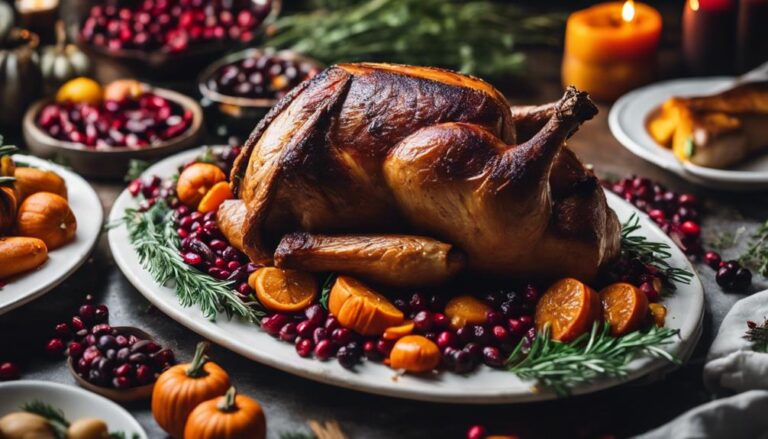Fourth of July Sous Vide BBQ Beans
Impress guests on the Fourth of July by trying Sous Vide BBQ Beans for a flavorful twist. By utilizing the sous vide method, you can guarantee your beans are perfectly cooked and infused with mouthwatering BBQ taste. Take your Independence Day feast to the next level with this unique dish. The sous vide technique locks in flavors and results in tender, delicious beans that will elevate your BBQ experience. Your taste buds will thank you. Get ready to savor every bite of these delectable beans.
What You Will Learn Here
- Sous vide method ensures precise cooking for tender and flavorful beans.
- BBQ seasoning infuses beans thoroughly for a rich taste.
- Perfect for Fourth of July gatherings with minimal hands-on cooking.
- Time-efficient preparation allows for stress-free hosting.
- Combines traditional BBQ flavors with modern cooking techniques for a delicious twist.
Bean Cultivation Origins
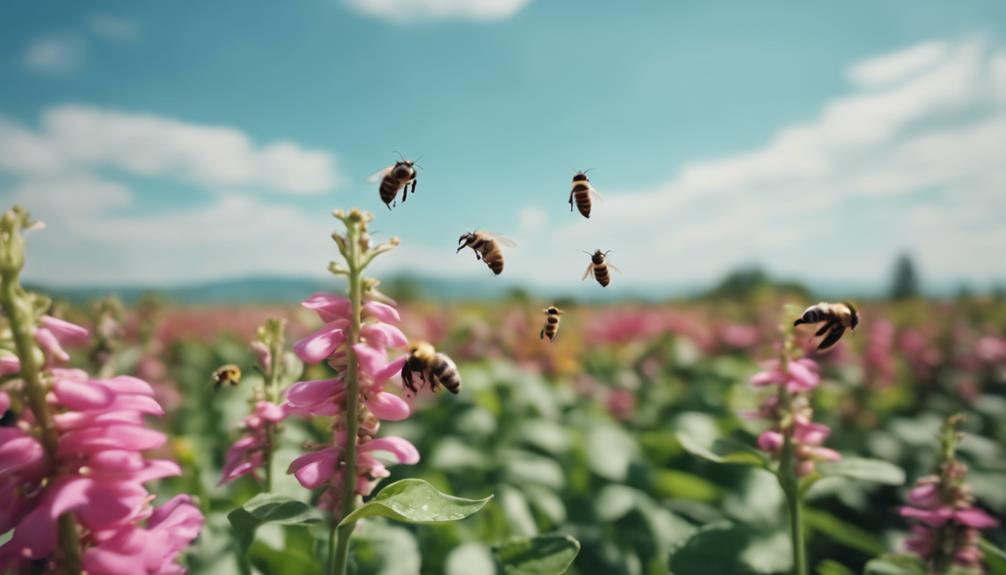
Explore the rich history of beans, tracing back centuries to unravel the intricate timeline of their cultivation.
Discover the ancient techniques that early farmers employed to grow and harvest these versatile legumes.
Uncover the diverse array of bean varieties that have been cherished and cultivated through generations for their unique flavors and nutritional benefits.
Bean History Timeline
The ancient origins of bean cultivation can be traced back to early human settlements, where these legumes played an essential role in the development of agricultural practices. Beans have been a staple food for centuries, with consumption trends showing a steady rise due to their versatility and nutritional benefits.
Rich in fiber, protein, and various vitamins and minerals, beans have been a fundamental component of diets worldwide. From the humble beginnings of wild bean varieties to the cultivation of different bean species like black beans, kidney beans, and chickpeas, the history of beans is a demonstration of human innovation and adaptability.
Understanding the historical timeline of bean cultivation provides insight into the evolution of agriculture and its impact on human civilization.
Cultivation Techniques Used
With ancient agricultural practices dating back to early human settlements, bean cultivation techniques have evolved over time, showcasing a rich history of innovation and adaptation. When it comes to sous vide applications for beans, the method allows for precise temperature control, ensuring the beans are cooked evenly while retaining their shape and texture. Flavor infusion techniques in sous vide involve sealing the beans with seasonings in a vacuum-sealed bag, allowing the flavors to penetrate deeply into the beans during the cooking process. This modern approach to cooking beans has revolutionized the way flavors are incorporated, enhancing the overall taste and texture of dishes. Below is a table highlighting some key cultivation techniques used in bean farming:
| Cultivation Technique | Description |
|---|---|
| Intercropping | Planting beans alongside other crops for mutual benefits. |
| Crop Rotation | Rotating bean crops with other plants to improve soil fertility. |
| Vertical Farming | Growing beans in vertically stacked layers for space efficiency. |
| No-till Farming | Planting beans without tilling the soil to reduce erosion and preserve nutrients. |
Ancient Bean Varieties
Rooted in the ancient soils of human history, the diverse array of bean varieties cultivated through centuries reveals a tapestry of agricultural ingenuity and cultural significance. Bean diversity spans from the creamy cannellini beans in Italian cuisine to the vibrant adzuki beans commonly used in Asian dishes.
Each variety offers unique culinary uses, from hearty stews to invigorating salads, showcasing the versatility of beans in global gastronomy. Beyond their delicious taste, beans pack a nutritional punch, being rich in fiber, protein, and essential vitamins and minerals.
Cooking methods vary from simmering to pressure cooking, preserving the beans' texture and flavor. Exploring ancient bean varieties not only connects you to the past but also enriches your present-day culinary experiences.
Bean Varieties & Selection
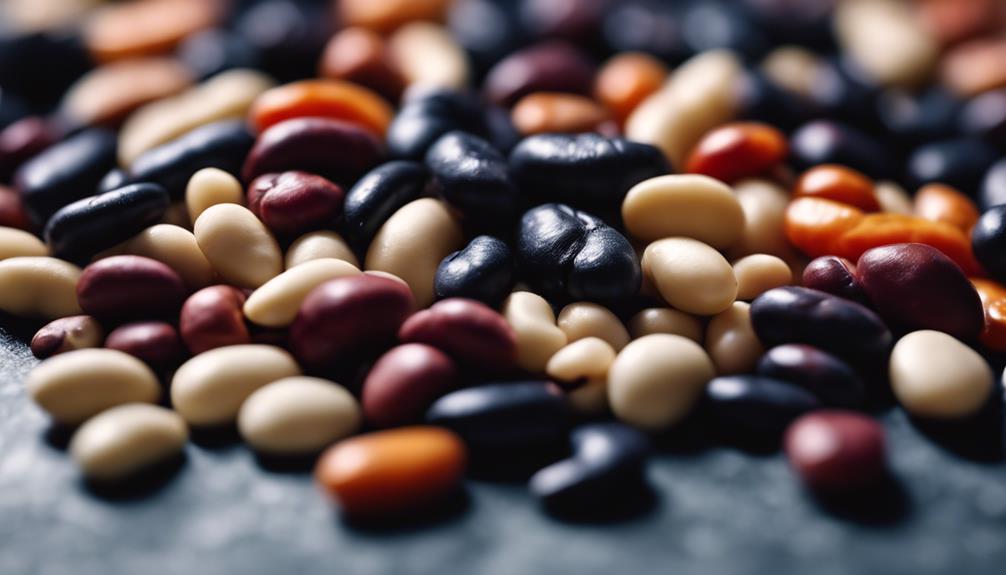
For best flavor and texture in your Fourth of July Sous Vide BBQ Beans, carefully selecting the right bean variety is crucial. When choosing beans for your dish, consider factors like size, color, and texture to guarantee a delightful culinary experience. Here are some tips to guide you in your selection process:
- Nutritional Profile: Different bean varieties offer varying levels of essential nutrients such as protein, fiber, and vitamins. Choose beans that align with your dietary needs to enhance the nutritional value of your BBQ dish.
- Flavor Intensity: Each bean variety has a distinct flavor profile, ranging from mild to robust. Select beans with flavors that complement the BBQ sauce and other ingredients for a harmonious taste.
- Texture: Some beans tend to hold their shape well during cooking, while others become creamier. Consider the texture you desire in your BBQ beans and choose a bean variety that aligns with your preference.
- Cooking Time: Certain bean varieties require longer cooking times to achieve ideal tenderness. Plan ahead and select beans that fit within your cooking schedule to avoid any delays.
- Visual Appeal: Beans come in various colors and sizes, adding visual interest to your dish. Choose beans that not only taste great but also contribute to the aesthetic appeal of your Fourth of July spread.
Savory Bean Creations
Explore a world of savory bean creations where classic BBQ baked beans mingle with the richness of smoky maple bacon beans and the depth of flavor in maple bourbon baked beans.
Elevate your bean game by experimenting with different ingredients and cooking techniques to achieve the perfect balance of sweet, smoky, and savory notes.
Whether you're a bean aficionado or a novice, these recipes offer a delicious twist on traditional favorites that are sure to impress your guests at any gathering.
BBQ Baked Beans Recipe
Discover the delectable world of BBQ Baked Beans, a delicious addition to any backyard cookout or summer gathering. When preparing this timeless dish, consider enhancing your grilling techniques to infuse a rich smoky flavor profile into the beans. The slow cooking process allows the beans to absorb the savory essence of the BBQ sauce and other ingredients, creating a delightful symphony of tastes.
Here are some tips for perfect BBQ Baked Beans:
- Slow and Low: Simmer the beans over low heat to develop deep flavors.
- Sweet and Savory: Balance the sweetness of molasses or brown sugar with tangy tomato paste.
- Layered Flavors: Add diced bell peppers and onions for a textural and flavorful contrast.
- Bacon Boost: Incorporate crispy bacon for an extra burst of smokiness.
- Spice it Up: Experiment with spices like paprika or chili powder for a kick of heat.
Smoky Maple Bacon Beans
Indulge your taste buds with the tantalizing combination of smoky maple and crispy bacon in these flavorful beans. The maple-infused flavors dance on your palate, perfectly complemented by the rich, savory notes of the bacon additions. Here's a deeper look at what makes these Smoky Maple Bacon Beans stand out:
- Rich Maple Infusion: Each bite bursts with the sweet yet robust essence of maple.
- Crispy Bacon Perfection: The bacon adds a delightful crunch and a smoky depth to the dish.
- Balanced Sweet and Savory: The maple and bacon play off each other, creating a harmonious blend of flavors.
- Umami Explosion: The combination of ingredients results in a satisfying umami taste that lingers on your tongue.
- Sensory Delight: From the aroma to the texture, every aspect of these beans is designed to tantalize your senses.
Maple Bourbon Baked Beans
Savor the robust flavors of Maple Bourbon Baked Beans, a delectable creation that combines the richness of maple with the depth of bourbon for a savory delight. These beans offer a perfect balance of sweetness and smokiness, making them a must-have addition to your Fourth of July feast. Here are some reasons why these beans stand out:
- Rich Bourbon Infusion: The bourbon maple flavor infuses each bean, creating a sophisticated taste profile.
- Caramelized Goodness: The baked sweetness caramelizes the beans, adding depth and complexity to every bite.
- Memorable Aroma: The aroma of bourbon and maple wafting from these beans will tantalize your senses.
- Complex Flavor Profile: The combination of bourbon maple and baked sweetness creates a harmonious flavor explosion.
- Perfect Side Dish: These beans pair perfectly with grilled meats, giving your taste buds a culinary adventure.
Bean Preparation Techniques
When preparing beans, consider soaking them overnight for best texture and digestibility.
The rapid soak method offers a time-saving alternative, reducing the soaking period considerably.
Pressure cooking beans can speed up the cooking process, perfect for those looking for a faster turnaround without sacrificing flavor.
Soaking Beans Overnight
Are you wondering why soaking beans overnight is a crucial step in preparing delicious Fourth of July Sous Vide BBQ Beans?
Overnight soaking allows the beans to absorb water slowly, resulting in a more even texture when cooked. This process also aids in flavor infusion, as the beans have ample time to soak up any added seasonings or aromatics.
By soaking the beans overnight, you're initiating the rehydration process, which can help guarantee that the beans cook more evenly and reduce cooking time. This method is particularly important for dried beans, as it helps soften them and break down some of the complex sugars that can cause digestive discomfort.
Quick Soak Method
To expedite the bean preparation process, consider utilizing the Quick Soak Method for efficient rehydration and best cooking results.
This method involves bringing the beans to a boil in a pot of water, letting them cook for a few minutes, then removing them from the heat and allowing them to soak for an hour. Quick soaking not only reduces the overall cooking time but also helps break down complex sugars in the beans, making them easier to digest.
Pressure Cooking Beans
Consider employing the pressure cooking method for beans to expedite the cooking process and achieve ideal texture and flavor. Pressure cooking beans is a game-changer, especially for those seeking a quicker alternative to traditional slow cooking methods.
By using pressure, beans can cook in a fraction of the time it would take with other techniques. This method not only saves time but also helps in flavor infusion, as the high pressure allows the beans to absorb seasonings and spices more efficiently.
The result is perfectly cooked beans with a rich taste that permeates every bite. So, if you're looking to cut down on cooking time without compromising on flavor, pressure cooking beans is the way to go.
Final Thoughts
In reflecting on the recipe journey, one can appreciate the depth of flavor achieved through the sous vide method for these Fourth of July BBQ beans. The slow cooking process allowed the beans to absorb all the rich, smoky flavors of the barbecue sauce and seasonings, resulting in a dish that truly embodies the essence of summer gatherings and patriotic celebrations.
| Final Thoughts | Description | Emotion |
|---|---|---|
| Sous Vide Method | Enhanced flavor by slow cooking | Satisfaction |
| BBQ Sauce | Infused smoky taste into each bean | Excitement |
| Summer Vibes | Perfect dish for outdoor parties | Joy |
| Family & Friends | Ideal for sharing with loved ones | Warmth |
| Patriotism | Red, white, and blue-themed celebrations | Pride |
These Fourth of July BBQ beans are not just a side dish but a representation of the freedom to savor delicious flavors and create lasting memories with those you cherish. As you enjoy the fireworks finale and patriotic festivities, let these beans be a reminder of the simple joys that come with good food and great company.
Frequently Asked Questions
Can I Use Canned Beans Instead of Dried Beans for This Recipe?
Yes, you can use canned beans instead of dried beans for this recipe. While canned beans offer convenience, they may affect the overall flavor compared to dried beans. Consider flavor substitutions for a twist or explore vegetarian options for a meat-free alternative.
Can I Substitute the BBQ Sauce With Another Type of Sauce for a Different Flavor?
Yes, you can substitute the BBQ sauce with different sauce options for flavor variations. Try experimenting with teriyaki, honey mustard, or sriracha for a unique twist. Enhance the dish with your favorite sauces to suit your taste preferences.
How Long Can I Store Leftovers of the BBQ Beans in the Refrigerator?
You can store the leftovers of the BBQ beans in the refrigerator for up to 3-4 days. The shelf life varies depending on the ingredients used. Properly sealed containers help maintain freshness, ensuring your beans stay delicious.
Can I Freeze the BBQ Beans for Later Use?
You can freeze the BBQ beans for later use. Store them in airtight containers for up to three months. When you're ready to enjoy them, thaw in the fridge overnight and reheat on the stovetop for best flavor.
Is It Possible to Make This Recipe Vegetarian or Vegan-Friendly by Omitting the Meat Ingredients?
Yes, you can easily make this recipe vegetarian or vegan-friendly by omitting the meat ingredients. Vegetarian options can include using plant-based proteins like tofu or tempeh, while flavor variations can be achieved with smoked paprika or liquid smoke.
Conclusion
Indulge in the rich, smoky flavors of Fourth of July sous vide BBQ beans. From their humble origins to the diverse varieties available, beans are a versatile and delicious addition to any summer cookout.
By mastering various bean preparation techniques, you can elevate your dishes to new heights.
So fire up the grill, grab a plate, and savor the satisfying taste of perfectly cooked beans on Independence Day.
